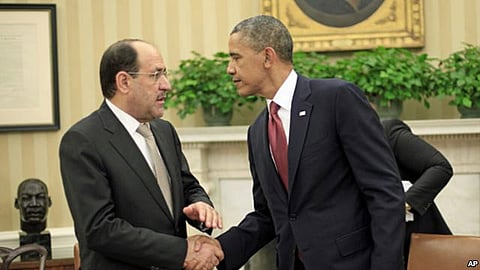US must stop deceiving itself about the ‘Surge’
While the US military kept its side of the bargain, Al Maliki did not keep his

With Iraqi cities falling to the Islamic State of Iraq and the Levant (Isil), it was probably inevitable that Washington’s politicians would look at the situation and decide that assigning blame to one another was just as important as deciding what the US ought to do. Republicans, unsurprisingly, place the blame on US President Barack Obama who, they say, pulled out of Iraq prematurely at the end of 2011. Democrats point out that if George W. Bush had not invaded Iraq in the first place the country would not now be on the edge of its second civil war in less than a decade. As things have got progressively worse, the Republican mantra has been that the military (and, by implication, the Bush administration) “won” the war, but Obama squandered their victory. John McCain, never one to miss an opportunity to call Obama weak, suggested that the president ought to fire his entire national security team and replace them with retired General David Petraeus and other officials who oversaw the Iraq war during the end of Bush’s presidency and the opening phase of Obama’s. “The fact is we had the conflict won and we had a stable government,” McCain said.
I do not mean to pick on the Arizona senator particularly, because his has simply been the loudest of many voices criticising Obama over the last few weeks. What I do want to tackle is this question of how Iraq can be described as a war America “won”. This claim — that the US left Iraq as a victor — is built almost entirely around the idea that Bush’s Surge policy in 2007 and 2008 “won” the Iraq war. It is perhaps the most enduring myth surrounding America’s decade in Iraq and one that is now coming back to haunt Obama. Seven years after Bush announced it, the thing everyone remembers about the “Surge” was that the US sent more troops to Iraq, cut deals with local tribal and militia leaders (which, in some cases, meant little more than bribing them to switch sides) and, as a result, largely ended the sectarian insurgency that was tearing Iraq apart. This paved the way for the troop withdrawal agreement that Bush signed in the waning days of his presidency — an agreement which Obama carried out over the three years that followed.
By the time Obama and McCain squared off in 2008’s presidential election, it had become almost universally accepted in the US that the Surge “worked”. Then and now any attempt to question this bit of conventional wisdom was challenged by American politicians and pundits. For many, questioning the Surge’s “success” was and is equated with criticism of the military itself — a social taboo in today’s America and something few politicians are ever willing to risk. Widely forgotten was the assertion in Bush’s original speech announcing the Surge that the policy had two parts. “A successful strategy for Iraq goes beyond military operations,” Bush had said. “Ordinary Iraqi citizens must see that military operations are accompanied by visible improvements in their neighbourhoods and communities. So America will hold the Iraqi government to the benchmarks it has announced.” He went on to outline the Iraqi government’s ambitious commitments to reconstruction and infrastructure investment and a promise from Iraqi Prime Minister Nouri Al Maliki to “establish a fair process for considering amendments to Iraq’s constitution” with the goal of ending sectarian strife.
The problem, of course, was that while the American military kept its side of that bargain Al Maliki did not keep his. He used the political breathing space the Americans bought him not to create a more inclusive government but to shore up his own power. Whether anyone else could have risen to that challenge is debatable. It is difficult to look at Iraq’s other political leaders and believe that in Al Maliki’s position they would have acted much differently. One can also debate just how hard the Bush and Obama administrations really tried to make the Iraqi side of the Surge work. By 2007, Bush was looking for a way out of Iraq. Obama was elected on a promise to bring US troops home. None of that, however, earns anyone a pass to promote the myth that the Surge was an unmitigated success. That myth remains largely unchallenged in the US, where it haunts Obama politically and skews debate on the current crisis.
Observers on Iraq have been saying for years that the failure of Al Maliki and the people around him to keep up their end of the Surge ‘bargain’ made today’s sectarian strife close to inevitable. As tragic as that is, it is not a problem that can be fixed by a new American intervention and intervention itself cannot be debated intelligently as long as Americans keep deceiving themselves about how successful the Surge really was.
Gordon Robison, a longtime Middle East journalist and US political analyst, teaches political science at the University of Vermont.


